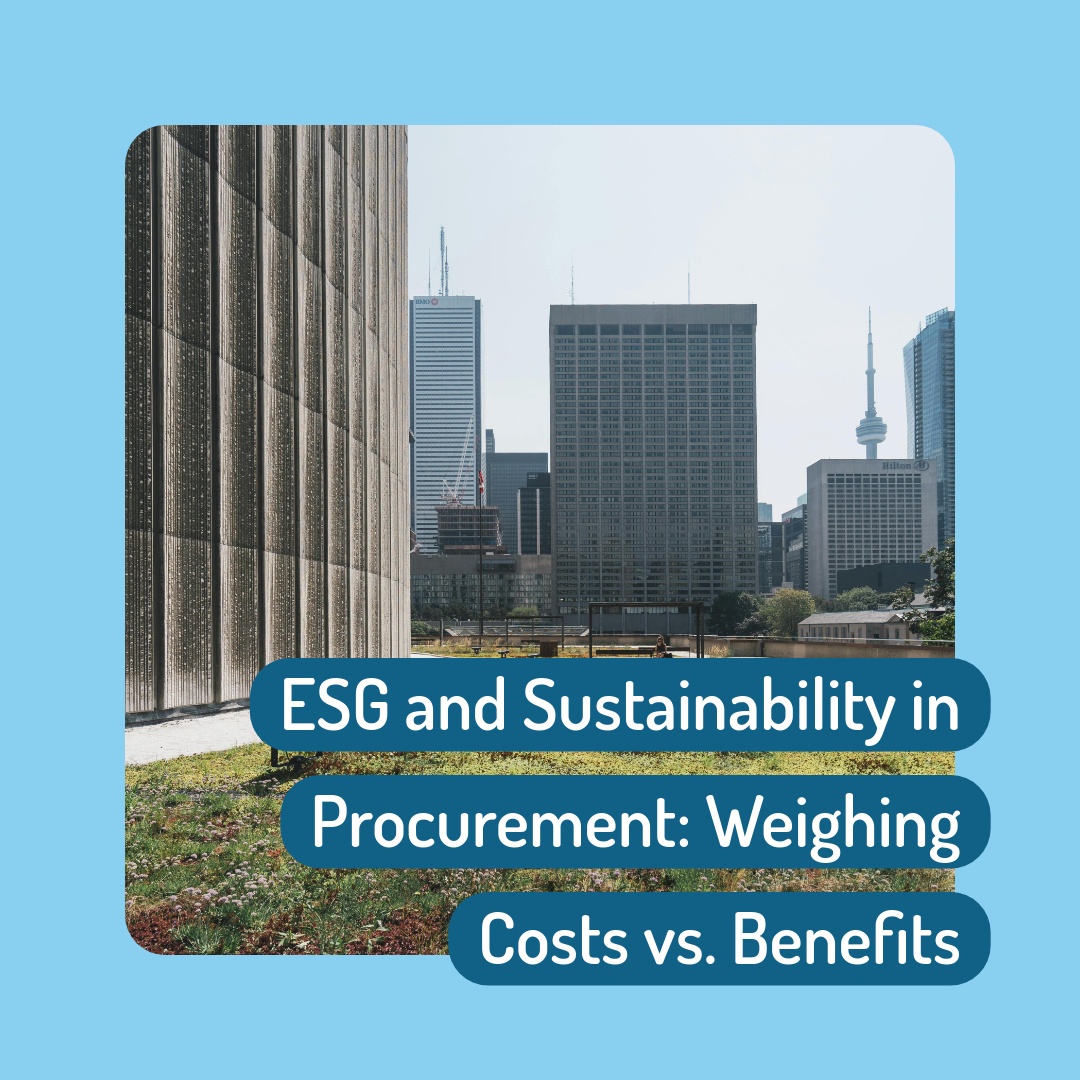ESG and Sustainability in Procurement: Costs vs. Benefits
ESG and Sustainability in Procurement Summary:
1. Significance ESG and Sustainability in Procurement
2. The Cost Implications of Implementing ESG and Sustainability in Procurement
3. The Benefits of ESG and Sustainability in Procurement
4. ROI of Sustainable Procurement

In today’s fast-paced world, where sustainability and ethical considerations are no longer just nice-to-have but imperative, businesses are increasingly aligning their procurement strategies with Environmental, Social, and Governance (ESG) principles.
This shift towards ESG and sustainability in procurement is not just a nod to corporate responsibility but a strategic move that impacts the bottom line.
So, let’s dive into the financial landscape of ESG and sustainability in procurement, exploring the costs, benefits, and what the future holds.
You Might Like This: How to Do Simple Cost Benefit Analysis
Significance ESG and Sustainability in Procurement
Procurement represents a significant portion of a company's environmental impact and social footprint. The materials sourced, the manufacturing processes employed by suppliers, and the logistics involved all contribute to your company’s overall ESG performance.
Integrating ESG and sustainability into procurement strengthens a your company’s position in several ways:
1. Enhanced Brand Reputation:
Consumers are increasingly drawn to brands that demonstrate environmental and social responsibility. Sustainable procurement practices showcase your company’s commitment to these values, boosting brand reputation and attracting environmentally conscious customers.
2. Reduced Risk:
Environmental regulations are constantly evolving, and supply chain disruptions are becoming more frequent. Sustainable procurement helps you mitigate risks associated with non-compliance and potential disruptions caused by unethical labor practices or environmental issues within the supply chain.
3. Improved Cost Efficiency:
Resource conservation and waste reduction are core principles of sustainable procurement. By prioritizing energy-efficient materials, minimizing packaging, and optimizing logistics, companies can achieve long-term cost savings.
4. Investor Confidence:
Investors are increasingly integrating ESG factors into their decision-making processes. Demonstrating a commitment to sustainability through a robust sustainable procurement strategy can attract environmentally and socially conscious investors, bolstering financial stability.
The Cost Implications of Implementing ESG and Sustainability in Procurement
Let's address the elephant in the room— transitioning to sustainable procurement often requires an initial investment that can be seen as a hurdle by many.
Here are some key costs considerations for you:
Cost Consideration 1- Supplier Evaluation and Onboarding
Assessing suppliers' ESG practices can require additional resources, including conducting audits and implementing new evaluation criteria.
Cost Consideration 2- Shifting to Sustainable Materials
Sourcing sustainable materials or switching to eco-friendly alternatives might incur higher initial costs compared to conventional options.
Cost Consideration 3- Logistics Optimization
Implementing sustainable logistics practices, such as reducing transportation emissions or using recyclable packaging, may require investments in new technologies or processes.
Remember: It's crucial to remember that these costs should be viewed as long-term investments. While initial outlays may occur, they are often outweighed by the long-term financial benefits associated with sustainable procurement.
The Benefits of ESG and Sustainability in Procurement
Despite the costs, the benefits of implementing ESG principles in the procurement cycle are manifold and can lead to a tide of financial gains in the long run:
Benefit #1- Risk Mitigation
Sustainable procurement reduces exposure to environmental, social, and governance risks, safeguarding against potential future costs such as regulatory fines and environmental penalties.
Benefit #2- Enhanced Brand Value and Reputation
Consumers and investors alike will favor you if you demonstrate a commitment to sustainability. By prioritizing ESG in procurement, you can enhance your brand image, attract ethical investors, and stand out in a crowded marketplace.
Benefit #3- Operational Efficiencies
While the initial shift towards sustainable procurement might be costlier, it often leads to long-term savings. For instance, investing in energy-efficient materials can reduce utility bills, and sourcing from local suppliers can cut down transportation costs.
Benefit #4- Market Opportunities
Sustainability can also open new markets and drive innovation, leading to products and services that meet the evolving demands of conscientious consumers.
ROI of Sustainable Procurement
Calculating the return on investment (ROI) for sustainable procurement includes tangible and intangible facets:
- Direct Savings: This concerns measurable reductions in energy consumption, waste, and cost efficiencies that can be directly attributed to sustainable practices.
- Indirect Savings: These savings manifest in the form of risk reduction, improved brand reputation, and increased customer loyalty, which contribute to sustained revenue streams.
- Competitive Differentiation: Sustainable procurement can differentiate a brand in the marketplace, creating opportunities for market leadership and the potential for increased market share.
There exist challenges in quantifying the ROI of ESG initiatives, particularly when considering indirect benefits such as brand reputation.
However, a growing body of evidence points to a strong correlation between sustainable procurement practices and enhanced financial performance.
Future Trends in ESG and Sustainability in Procurement
The future of procurement is inextricably linked to the principles of sustainability and ESG. Here are 4 trends that are shaping the landscape:
- Technology and Transparency: Blockchain and AI are poised to revolutionize procurement, enhancing transparency in supply chains and enabling better monitoring of ESG criteria.
- Regulatory Momentum: As governments enact stricter regulations around sustainability, compliance will be non-negotiable. Companies that are ahead of the curve will benefit from reduced adjustment costs.
- Circular Economy: The transition to a circular economy model will alter procurement strategies, favoring materials and methods that prioritize reuse and recycling.
- Collaborative Networks: There will be an acceleration in the formation of collaborative networks that allow companies to share resources and knowledge to achieve ESG goals more effectively.
The evolution of sustainable procurement is ongoing, and the companies that adopt and innovate with these trends in mind are the ones that will thrive.
How Can You Take the Lead in ESG and Sustainability in Procurement?
If you're eager to steer your procurement career towards sustainability and ESG leadership, gaining the right knowledge and credentials is essential.
The Certified International Procurement Professional (CIPP) and Certified International Procurement Manager (CIPM) online certification programs, offered in conjunction with the International Purchasing and Supply Chain Management Institute, USA (IPSCMI), are your gateway to specializing in sustainable procurement and much more.
Here’s what the certifications offer:
- Partnership with IPSCMI: Developed in conjunction with the International Purchasing and Supply Chain Management Institute, USA.
- One Fixed Enrollment Fee: Transparent pricing with no hidden costs. CIPP and CIPM both priced at USD 2,245.
- Certification Objectives: Aim to promote professional status, improve efficiency and effectiveness, and develop ethical standards in purchasing.
- Online Certification Exam: Assessments conducted online for convenience, with certification granted upon successful completion.
- Benefits: Professionalism, recognition, leadership, knowledge enhancement, and a commitment to ethical behavior in procurement.
Check out these certifications through the Purchasing and Procurement Center here now!
Value of Sustainable Procurement is Only Set to Increase
As we look to the future, the importance of sustainable procurement is only set to increase. By embracing this trend now, you can position yourself as a leader in sustainability.
It’s important to keep in mind that the shift towards ESG and sustainability in procurement is not just a moral imperative but a strategic necessity that can drive real financial value for your organization.
Interested in deepening your procurement expertise? Enroll into our Practical & Real-Life Procurement Training Courses, encompassing 95% of essential procurement skills and competencies— and gain the competitive edge you need to excel your value.
Get Back From ESG and Sustainability in Procurement to Supplier Risk Management




